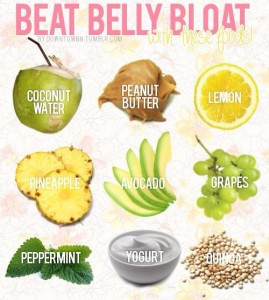
Our beauty blogger Catherine McCurry takes a look at how to tame the bloated belly
THERE’S all kinds of reasons and explanations as to why our stomach can bloat like a balloon throughout different stages of the day, whether it’s too much food, cups of tea or maybe it’s a health condition.
Whatever triggers your bloated belly it can often end up looking like you are heavily pregnant which may not reflect your diet, unless you have cleared a three course carbo-loaded meal consisting of pizza and takeaways.
I always try my best to follow a healthy lifestyle by eating clean, good food and while there are times when I find myself clawing through the treats cupboard, it’s not very often but I still end up with a very swollen stomach.
I recently read that high-protein diets can leave people bloated and constipated as they are getting very little fibre in their diet. But, on the other hand, sticking to just high-fibre foods can also swell stomachs to twice its normal size. We just can’t win.
It appears there are an array of issues that explain the bloated belly and it’s unique to each individual. Often, bloating is caused by irritable bowel syndrome (IBS) which is an over-sensitive gut and affects thousands of people.
Some of the recommended foods to help treat bloated bellies are coconut – which can be found in most supermarkets and has become very popular recently – peanut butter, lemon, pineapple, avocado, grapes, peppermint – try herbal peppermint tea – yoghurt (low fat) and quinoa. I’ve also heard that taking Wheat Grass at night time can help bloated stomachs and it can be purchased from selected supermarkets for around £10.
Some of the causes of this inconvenience is down to excess wind, swallowing air – surprisingly from talking while eating – food intolerance and IBS.
Talking while eating is a common thing and despite it being one of my pet hates, there’s good reasons to have table manners. It’s advised to refrain from talking while eating so you’re not taking in excess air, though I’m not sure how much this contributes to a bloated belly but it’s another step to remedy this plaguing issue.
Another reason could be down to Coeliac disease where your intestine is not able to absorb gluten found in wheat, barely, oats or rye. It’s advised to see your GP if you suspect you have Coeliac disease.
Food intolerance is a huge issue for many people. It can lead to bloating when your bowel doesn’t empty properly, your food causes gas to be trapped or too much gas is produced as a reaction to the food.
The main causes for food intolerance can be found in dairy, wheat or gluten products. Try cutting down on a particular food type to see if this helps ease the problem.
Keep a food diary for a few of weeks, and take note of everything you eat and drink and when you find you are most bloated. This should help pin-point what foods are giving you that bloated belly.











